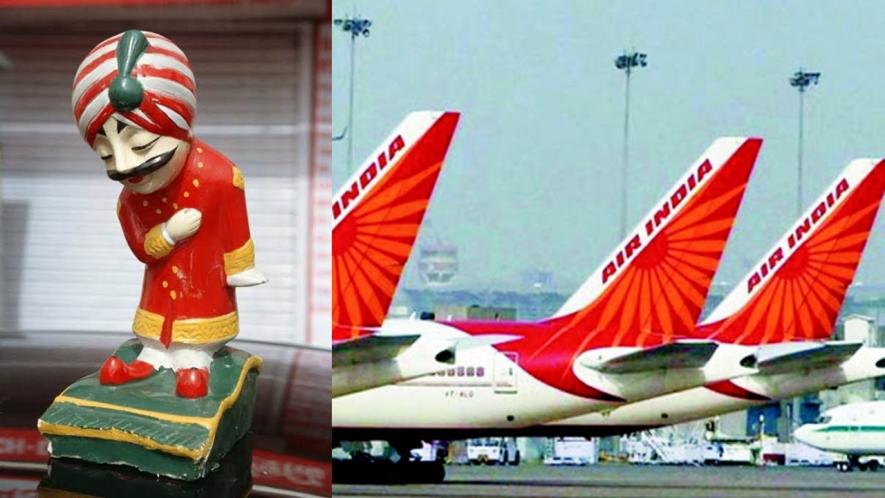Maharaja Turned to a Pauper Before Sell-Off

After a failed attempt to sell off Air India in its first term, the Narendra Modi government has restarted the process of completely exiting from the ‘national carrier’ by seeking to sell 100% of its equity share capital in the company. This process includes Air India’s shareholding interest of 100% in Air India Express Limited and 50% in Air India SATS Airport Services Private Limited.
Those interested in bidding for Air India must have a net worth of merely Rs 3,500 crore. The sale will be implemented through the open bidding route, with March 17, 2020 set as the deadline for interested parties to submit their Expressions of Interest (EoI). After identifying the pre-qualified bidders by March 31, the government would launch the second phase of the divestment process by inviting price bids, following which it would zero in on the buyer.
Global professional services provider Ernst & Young has been appointed the transaction advisors for the divestment process. "The GoI has given an ‘in-principle’ approval for the strategic disinvestment of Air India by way of transfer of management control and sale of 100 percent equity share capital of AI held by GoI, which will include AI’s shareholding interest of 100 percent in AIXL and 50 percent in AISATS," the EoI document released on January 27 stated.
VALUATION
It is not clear whether the government has come to a conclusion yet on the valuation of the airline. During the last Winter Session in the Lok Sabha, the Civil Aviation Minister had replied emphatically: “No Sir”, when he was asked “whether the government has valued Air India and all its subsidiary companies together” and, if so, what is the total worth. Even if it has valued the airline in totality, can it be dependable?
The exercise of valuation of some public sector undertakings (PSUs) carried out over the past few years has been pathetic, one of the latest being that of the IRCTC. The Indian Railways itself protested over the pricing of its subsidiary, IRCTC, by the government. The initial public offering of the IRCTC last October saw an overwhelming response and was listed at 101% premium.
The Railways lodged a protest about the price at which shares were offered to the investors. IRCTC shares, which were issued at Rs 320 by the government, listed at Rs 644 on the Bombay Stock Exchange and closed at Rs 729, valuing the company at nearly Rs 11,700 crore. The government, on the other side, had raised Rs 645 crore for a 12.6% stake that it sold, which valued the company at a mere Rs 5,000 crore. So, if at all any valuation of Air India has been carried out, though it does not show in the EoI document, the figure has to be taken with a pinch… NO, a load of salt.
FINANCIALS
Besides offloading its entire stake in the state-run airline, which is the nation’s flag carrier, the government has revised other conditions, such as lowering the debt that is to be transferred, to make the sale process more attractive for prospective buyers. It has decided to reduce the airline’s debt from the previous Rs 60,074 crore to Rs 23,286 crore.
The government has also clarified that the net working capital of Air India is now zero, which means that the Maharaja’s current assets are equal to its current liabilities. If the government finally decided to write-off the airline’s debt before privatising it, it is absolutely not understandable why it did not absorb the debt, then restructured the airline and allowed it to turn profitable?
On its profit-making subsidiary which is also to be sold, the bid document states that the “Confirmed Selected Bidder shall ensure that AI and Air India Express Limited (AIXL) continue their business of providing air transport services on a going concern basis for a period of three years from the date of the closing of the Proposed Transaction on terms as may be specified in the definitive documents provided the foregoing shall not restrict route rationalization by AI and AIXL or any actions, steps or decisions taken for operational and financial efficiency of AI and AIXL.”
The national carrier, whose net loss in FY19 had ballooned to Rs 8,556 crore from Rs 5,348 crore in the preceding year, has total liabilities of over Rs 52,000 crore. To attract additional suitors this time, the government has already parked nearly Rs 30,000 crore of debts and liabilities in a special purpose vehicle (SPV). This means that the public exchequer will absorb this cost, instead of the private investor.
The new owner of the airline will be left with only Rs 23,286 crore worth of debt, as opposed to the Rs 62,000 crore debt estimated earlier. The debt was taken primarily for aircraft purchases which are currently secured against government guarantees. The guarantees will lapse once the new buyer takes over. While AIXL is the profitable low-cost arm of Air India, which flies to short haul international destinations, AISATS is a joint venture that provides ground and cargo handling services. The Centre holds 50% stake in AISATS.
EMPLOYEES
Though it’s still unclear what the government plans to offer to the employees of Air India and its various subsidiaries, union representatives of various sections of its employees – from engineers and ground handling staff to the pilots, met the management in New Delhi on Monday and discussed various employee-related issues ahead of the carrier's proposed privatisation.
The internal mechanism panel, comprising members from both the Air India management and its trade unions, met for the first time. The trade union representatives are said to have discussed with the management all issues concerning their employment such as service-contracts, job-security, gratuity, pension and voluntary retirement scheme after the company goes into private hands, the source privy to the meeting proceedings told PTI.
Air India had on last Tuesday constituted this nine-member committee to look into staff-related issues after discussions between Civil Aviation Minister Hardeep Singh Puri and representatives of various Air India unions. "During the meeting, which lasted for about 4-5 hours, various unions representatives raised the issues such as job-security, service-contracts, gratuity, pension, the possibility of VRS and other HR related problems that may crop up after the airline is privatised," the source said.
According to official figures, there are a total of 17,984 employees at Air India and Air India Express. These include 9,617 permanent employees. The count also takes into account those on deputation at the airline. Excluding the deputationists, the total count would be about 16,000.
One thing that the EoI document makes clear is that the Confirmed Selected Bidder shall ensure that 3% of the equity shares of the company acquired by it (or the special purpose vehicle in case investment in Air India is made through a special purpose vehicle) are offered to the permanent employees of Air India as per the terms of an employee stock ownership plan (ESOP).
The Air Corporation Employees’ Union had earlier stated that it had conveyed its opposition to privatisation to the government “at the highest level”, but the government “has ignored the logical and reasonable arguments of the Union” and went ahead with the process which is “ill-advised”. ”The decision taken at the political level is fraught with disastrous consequences both from the point of view of growth of civil aviation and in the interest of defence of our country”,” it said.
Air India has long been vilified as a poster boy of what ails our public sector organisations. Never has the government owned up its responsibilities in reducing this major player in the global aviation market to nothing, with its decisions ranging from high taxation on aviation fuel and other charges and not giving it the freedom to take its own commercial decisions. The complete sell-off of Air India has come only after its owner has turned the Maharaja into a pauper.
(The writer was deputy executive editor of Press Trust of India and has covered civil aviation and defence extensively. The views are personal.)
Get the latest reports & analysis with people's perspective on Protests, movements & deep analytical videos, discussions of the current affairs in your Telegram app. Subscribe to NewsClick's Telegram channel & get Real-Time updates on stories, as they get published on our website.
























